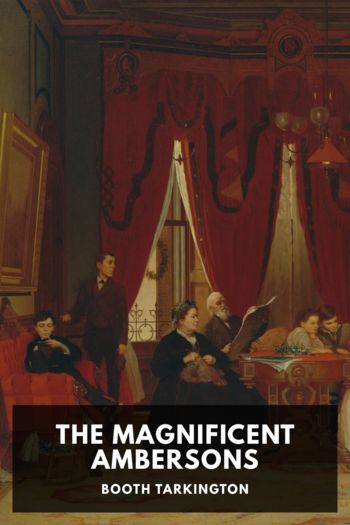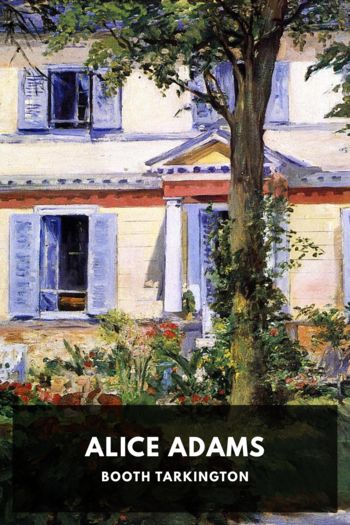National Avenue by Booth Tarkington (book recommendations website .txt) 📕

- Author: Booth Tarkington
Book online «National Avenue by Booth Tarkington (book recommendations website .txt) 📕». Author Booth Tarkington
For, as Martha had felt, these were his great days, and he was in on everything. The Earl of Ornaby was earl of more than Ornaby now; Ornaby and the Ornaby Four were but two of the adventurous fleets he had at sea. He was in on a dozen promotions at once; in on the stock of new “industrials”; inventors and exploiters lived at his office doors. And although all of his fellow-hustlers used the phrase, none could say “my city” with a greater right than he. When he began one of his boostings with, “I believe first of all in my own city,” the voice of a religion was heard. He was his city; he was its spirit, and more than any other he was its guide, and yet its slave and worshipper. He could not speak of it except with reverence, nor go on speaking of it long unless he made the eagle scream.
He had become a juggler of money, which poured streaming into one hand as fast as he hurled it aloft with the other. He was one of those men of whom it is said, “Nobody knows what he’s worth. He couldn’t tell you, himself, to save his life!” He was called “rich,” and sometimes he was said to be the richest man in town. He juggled with money, with land, with houses, with skyscrapers, and with factories, keeping them all in the air at once; and his brother said that even so, Dan still “danced the tightrope,” maintaining his balance dangerously during the juggling. Meanwhile, as he balanced and tossed the glittering and ponderous things through the air, the rest of the deafening show went on; the hustling and booming and boosting moving round and round him in clouds of dust to the sound of brass bands, while crowds gazed marvelling up at the juggler, and admired and envied him.
Of all the admirers who now looked up to him, cheering, probably the most enthusiastic was his brother-in-law, George McMillan, whom Dan had made “General Manager of the Ornaby Four.” George had not quite fulfilled his own prediction that at forty he was to be a “drunken broker”; but he had come, as he said, “near enough to it”; and he was glad when Dan finally sent for him and his designer of a new gasoline engine, the prospective Ornaby Four.
“It’s the greatest idea in the world,” George told his sister. “It’s cheap, but not the cheapest; it doesn’t compete with the commonest little cars, nor, on the other hand, with even the moderately expensive ones. It’s got a place of its own in between, where there are millions of people that can afford a little better car than the cheapest, but wouldn’t dream of a luxurious one like the ‘Morgan.’ It was an inspiration of Dan’s to set the price of the ‘Ornaby’ at eight hundred and eighty-five dollars. I like the sense of adventure you get in a game like this. I like getting out of my New York, and I like the way things move in a place so friendly as this. It’s immensely alive, but somehow it does manage to be friendly, too. I don’t understand why you’ve always hated it so.”
She explained that she had hated it less when she was in Europe, where she had at last got her year, having taken young Henry with her in spite of her husband’s strong protest. The mother and son had just returned. “I think I could stand the place perfectly well, George,” she said, “if I were quite sure I’d never have to see it again!”
“But don’t you begin to understand yet what a husband you’ve got?” George cried. “Why, he’s a great man, Lena!”
Lena laughed and looked at him pityingly; but contented herself with that for argument. To her mind Dan was not made great by becoming the great figure of a city that was merely growing larger, noisier, and dirtier. She had never cared for anything but Beauty, she said; and, to her mind, as to that of the fastidious Harlan, Dan was only helping to increase hideousness; so she joined her brother-in-law in habitually referring to “Ornaby the Beautiful” as “Ornaby the Horrible.” Moreover, although she had never manifested any interest in National Avenue before its destruction began, she became almost vehement upon the subject of its merit as the razing of its old houses continued; and Harlan was again in agreement with her here.
“You and Eugene Morgan and that rascally old Sheridan and your Jew friends are doing an awful thing,” he said to Dan at a family dinner. “You’re ruining the one decent thing the city possessed—a splendid, dignified old street. It’s happening all over the country—one doesn’t need half an hour in New York to see that Fifth Avenue is ruined; but I did think we might have escaped here. I doubt if it would ever have occurred to Morgan to put up his awful sales building—with a repair shop in it!—on National Avenue, if you hadn’t done it first. Then the others thought they had to follow; and if something isn’t done to stop you fellows, the whole avenue will be nothing but a mile row of motorcar sales buildings and pneumatic tire warehouses and garages—a market!—and with hundred-foot smokestacks! It may reach even here to our old house and the Shelbys’; and already you’ve made the peaceful neighbourhood around my house horrible. I’d like to know what grandma Savage would have said about the things you people have done to this town! Why, you’ve made National Avenue begin to look like an old pipe-smoking hag’s mouth with every other tooth missing and the rest sticking up all black in the smoke.”
Dan laughed absentmindedly, but remained impervious. Like the ardent Sheridan, he loved the smoke, called it “Prosperity,” and drew his lungs full of it, breathing in it the glory





Comments (0)